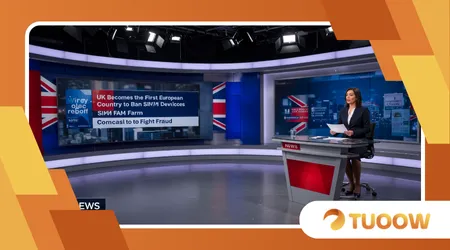UK Becomes First European Country to Ban SIM Farm Devices to Combat Fraud

UK Becomes First European Country to Ban SIM farm devices, a groundbreaking move to curb fraud.
Announced on April 24, 2025, this ban targets sophisticated tools used by scammers to flood mobile networks with deceptive texts.
With fraud now accounting for over 40% of reported crimes in England and Wales, the government’s decisive action signals a new era in combating digital crime.
This article explores the ban’s implications, the mechanics of SIM farms, and why this matters for every UK citizen.
Join us as we unpack a policy that’s both a technological crackdown and a cultural statement.
Fraud has become a relentless shadow in our hyper-connected world. From phishing texts masquerading as bank alerts to fake delivery notifications, scam messages exploit trust.
The UK’s pioneering ban, embedded in the Crime and Policing Bill, positions it as a leader in Europe. But what does this mean for consumers, businesses, and the fight against fraud?
Let’s dive into the details, blending hard facts with a human lens on a policy that’s as much about protection as it is about progress.
The Rise of SIM Farms: A Criminal’s Toolkit
Imagine a device no larger than a laptop, humming with hundreds of SIM cards, each firing off thousands of scam texts in seconds.
That’s a SIM farm a criminal’s dream and a consumer’s nightmare. These devices exploit mobile networks by mimicking legitimate traffic, overwhelming defenses.
UK Becomes First European Country to Ban SIM farms to disrupt this cycle, targeting the tools that enable mass fraud.
Scammers use SIM farms to send texts that appear personal but are anything but. For example, Jane, a Manchester nurse, received a text claiming her bank account was compromised.
Panicked, she clicked a link, losing £2,000. Such stories are common, with SIM farms amplifying the scale. The ban aims to choke this pipeline, making it harder for criminals to operate undetected.
++ UK Lifts Sanctions on Syrian Ministries Following Regime Change
The Home Office reports fraud surged 19% last year, with scam texts hitting 64% of UK adults roughly 35 million people.
SIM farms fuel this epidemic, exploiting cheap SIMs and lax oversight.
By outlawing their possession without justification, the UK sets a precedent, forcing criminals to rethink their tactics.

Why the Ban Matters: A Game-Changer for Fraud Prevention
This isn’t just about banning gadgets; it’s about reclaiming trust in digital communication.
UK Becomes First European Country to Ban SIM farms, signaling a proactive stance against fraud’s emotional and financial toll.
The ban, effective six months after the Crime and Policing Bill’s royal assent, introduces unlimited fines in England and Wales, with £5,000 penalties in Scotland and Northern Ireland.
Consider the ripple effects. Mobile operators, already investing in anti-scam tech, gain a legal ally.
Also read: The UK’s Relationship with the US: Stronger or Weaker?
For instance, Vodafone UK’s Rachel Andrews called the ban “an important step,” emphasizing collaboration between industry and government.
Consumers, meanwhile, may see fewer dodgy texts, reducing the risk of falling for scams. It’s a win for clarity in a cluttered digital world.
Yet, challenges remain. Criminals adapt quickly, potentially shifting to encrypted apps or overseas networks.
The ban’s success hinges on enforcement and global cooperation. Still, it’s a bold first move, setting a benchmark for Europe and beyond. Why shouldn’t every nation follow suit?
How SIM Farms Work: The Tech Behind the Scam
To grasp the ban’s impact, let’s peek under the hood of a SIM farm. These devices, often cobbled together in backrooms, hold hundreds of SIM cards, each acting as a unique phone line.
UK Becomes First European Country to Ban SIM farms to stop this tech from weaponizing networks against us.
Picture a fraudster loading a SIM farm with 200 SIMs, each sending 1,000 texts daily. That’s 200,000 scam messages in 24 hours from one device.
Software automates the process, randomizing numbers to evade detection. It’s like a digital hydra cut off one head, and another appears, unless you target the source.
| SIM Farm Capabilities | Details |
|---|---|
| SIM Card Capacity | 100–1,000 |
| Texts Sent per Day | Up to 1M |
| Cost of Device | £500–£5,000 |
| Detection Evasion | Number rotation, VPNs |
The ban criminalizes possession without “good reason,” closing loopholes. Legitimate uses, like telecom testing, remain exempt, but illicit operators face severe penalties.
This precision ensures innovation isn’t stifled while fraudsters are cornered.
The tech’s simplicity is its strength. Affordable and portable, SIM farms are a low-barrier entry for criminals.
By targeting them, the UK disrupts a key node in the fraud ecosystem, forcing scammers to seek costlier, riskier alternatives.
The Human Cost of Fraud: Beyond the Numbers
Fraud isn’t just a statistic; it’s a personal violation.
UK Becomes First European Country to Ban SIM farms to address the human toll shattered trust, drained savings, and emotional scars.
Take Michael, a retired teacher from Leeds, who lost £10,000 to a scam text posing as HMRC. His story echoes millions.
The emotional fallout is profound. Victims report shame, anxiety, and distrust of technology. With 35 million UK adults receiving suspicious texts, the scale is staggering.
The ban aims to reduce these incidents, restoring confidence in digital interactions.
Beyond individuals, fraud erodes societal trust. Businesses face reputational hits when scammers impersonate them.
Banks spend billions on fraud prevention, costs often passed to consumers. By targeting SIM farms, the UK tackles a root cause, easing this burden.
The policy also empowers victims indirectly. Fewer scam texts mean fewer opportunities for fraudsters to exploit vulnerabilities.
It’s a step toward a safer digital landscape, where trust isn’t a luxury but a given.

Challenges and Criticisms: Can the Ban Deliver?
No policy is flawless, and the SIM farm ban faces scrutiny. UK Becomes First European Country to Ban SIM farms, but enforcement is the real test.
Critics argue that tech-savvy criminals will pivot to alternatives, like VoIP or dark web platforms, bypassing the ban’s reach.
Enforcement logistics raise questions. How will authorities distinguish legitimate SIM farm use from criminal?
The Home Office must clarify “good reason” exemptions to avoid overreach. Small businesses using SIMs for marketing fear collateral damage if rules are too vague.
Global coordination is another hurdle. Fraudsters operate across borders, with SIM farms often sourced from Asia or Eastern Europe.
Without international alignment, the UK’s ban risks pushing crime elsewhere. Cooperation with Europol and telecom giants is crucial.
Skeptics also point to mobile operators’ mixed track record.
Despite anti-scam tech, texts still slip through. The ban must pair with robust network filters to maximize impact. Otherwise, it’s a half-measure in a global fight.
The Broader Impact: Setting a Global Standard
The UK’s move isn’t just local it’s a clarion call. UK Becomes First European Country to Ban SIM farms, inspiring other nations to act.
Fraud is a global scourge, and the UK’s policy could spark a domino effect across Europe and beyond.
Think of it like a lighthouse in a storm. By illuminating one path, the UK guides others. Countries like Germany, facing similar fraud spikes, may adopt similar bans.
The EU, often slow on tech policy, could take note, harmonizing regulations.
Industry benefits too. Telecoms gain a framework to tighten security, potentially standardizing anti-fraud protocols.
Consumers worldwide could see safer networks, reducing the universal headache of scam texts. It’s a rare policy with both local and global resonance.
The ban also elevates the UK’s tech leadership. Post-Brexit, it showcases regulatory agility, blending innovation with protection.
If successful, it could redefine how nations tackle digital crime, making the UK a model for others.
Collaboration: The Key to Lasting Success

This ban isn’t a solo act it thrives on partnership.
UK Becomes First European Country to Ban SIM farms, but its success depends on industry, law enforcement, and consumers working together.
Fraudsters exploit silos; defeating them requires unity.
Mobile operators are already on board. Vodafone’s endorsement highlights industry buy-in, but more is needed. Real-time data sharing between networks can flag SIM farm activity faster.
Law enforcement, meanwhile, needs tech training to seize and analyze these devices.
Consumers play a role too. Reporting scam texts to services like 7726 strengthens detection algorithms.
Public awareness campaigns can amplify the ban’s impact, educating users on spotting fraud. It’s a collective shield against a common enemy.
International collaboration is non-negotiable. The National Crime Agency’s Nick Sharp noted fraud’s universal impact.
Aligning with global telecom bodies ensures SIM farms don’t just relocate. Unity turns a national ban into a global deterrent.
Looking Ahead: A Safer Digital Future
The SIM farm ban is a milestone, not a finish line. It’s a bold step toward a world where digital trust is default, not debated.
UK Becomes First European Country to Ban SIM farms, setting a tone for proactive governance in a tech-driven age. But the fight against fraud is ongoing.
Future policies must evolve with technology. AI-driven scams, encrypted networks, and new devices will test resolve.
The UK’s ban shows adaptability, but staying ahead requires vigilance. Investing in cybersecurity education and innovation is critical.
For now, celebrate the win. Fewer scam texts mean fewer stories like Jane’s or Michael’s. The ban empowers us to reclaim our inboxes and our peace of mind.
It’s a reminder that policy, when bold and human-centered, can reshape our digital lives.
As we move forward, let’s ask: what’s next in the fight for a fraud-free future?
The UK has lit the spark now it’s up to us, from policymakers to phone users, to keep the flame alive.
Frequently Asked Questions
What is a SIM farm?
A SIM farm is a device holding multiple SIM cards, used by scammers to send thousands of fraudulent texts simultaneously, exploiting mobile networks.
Why is the UK banning SIM farms?
The ban targets fraud, which accounts for 40% of UK crime, aiming to reduce scam texts and protect consumers from financial and emotional harm.
When does the ban take effect?
It starts six months after the Crime and Policing Bill receives royal assent, likely in late 2025 or early 2026.
Will the ban stop all scam texts?
No, but it disrupts a key tool. Criminals may adapt, so ongoing tech upgrades and global cooperation are essential.
Can legitimate businesses still use SIM farms?
Yes, if they have a “good reason,” like telecom testing. The ban targets illicit use, with clear exemptions to avoid overreach.
